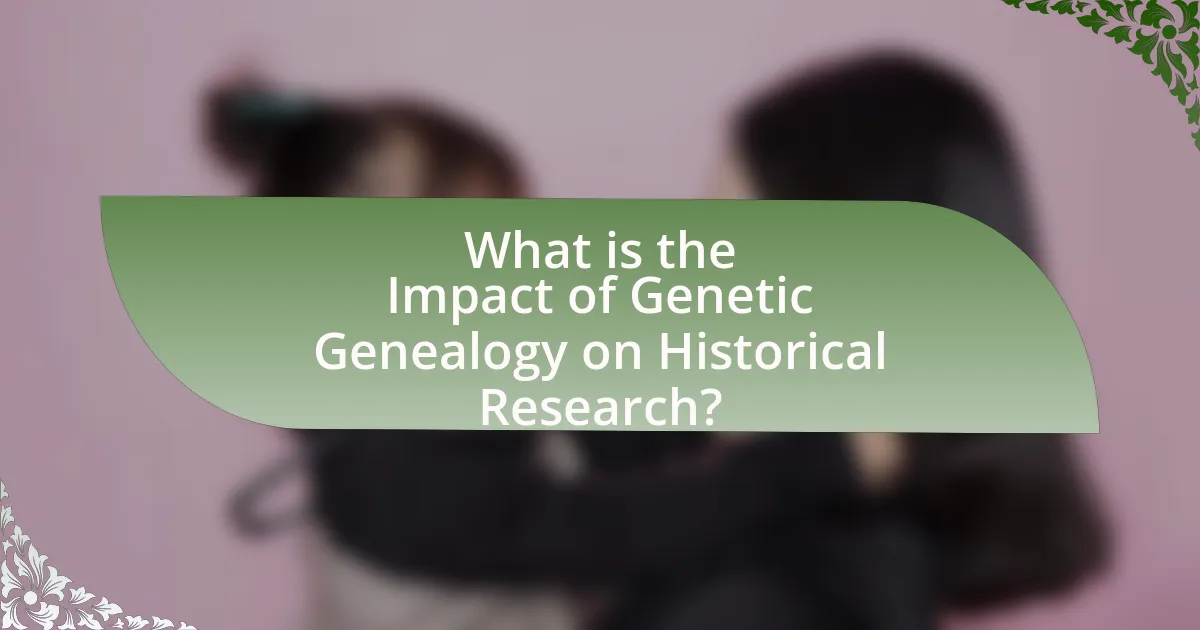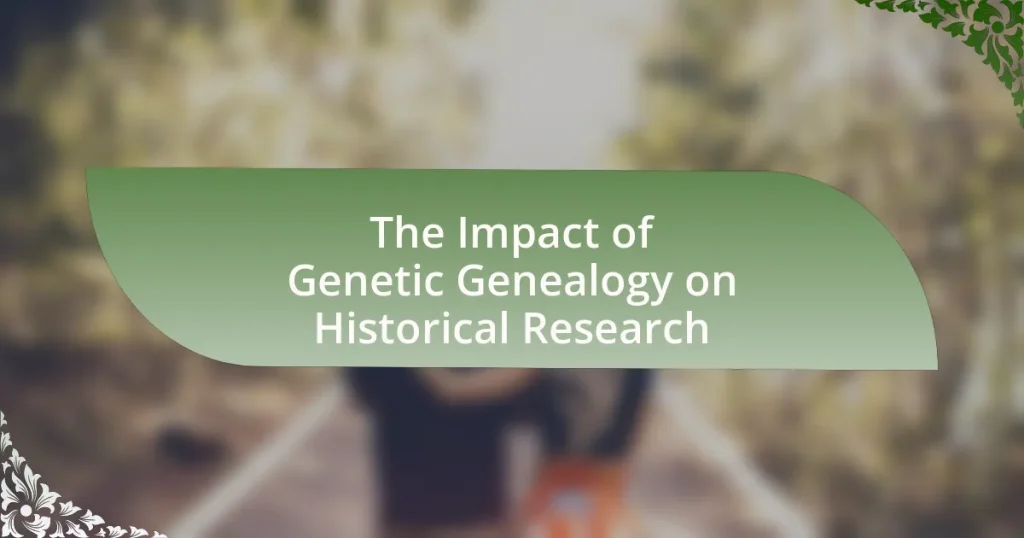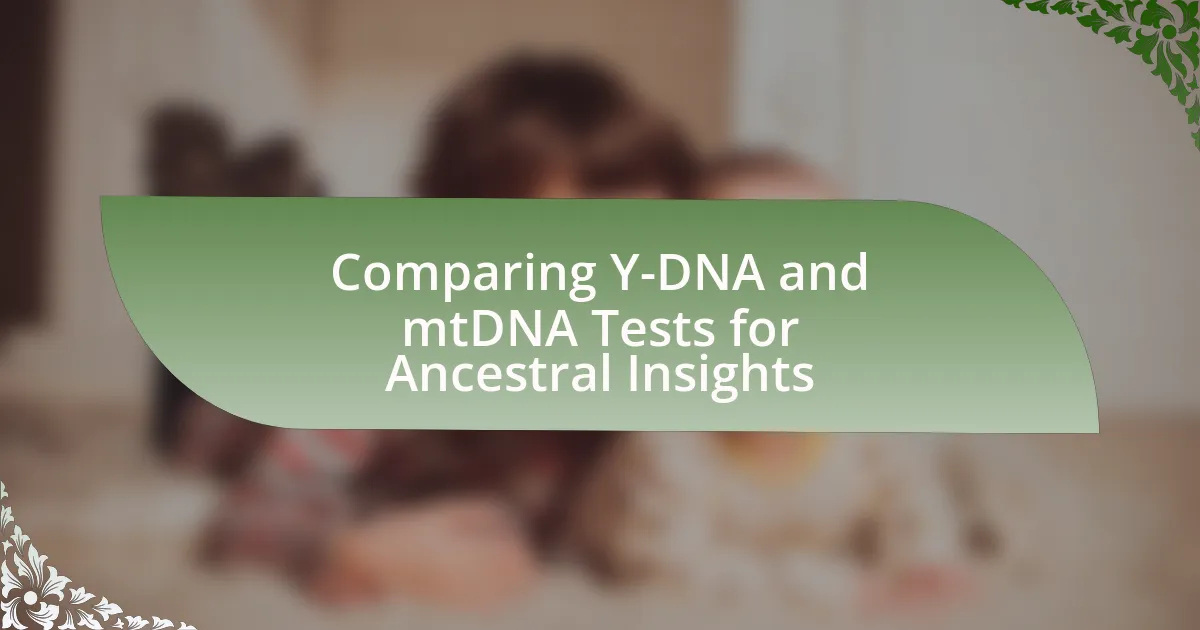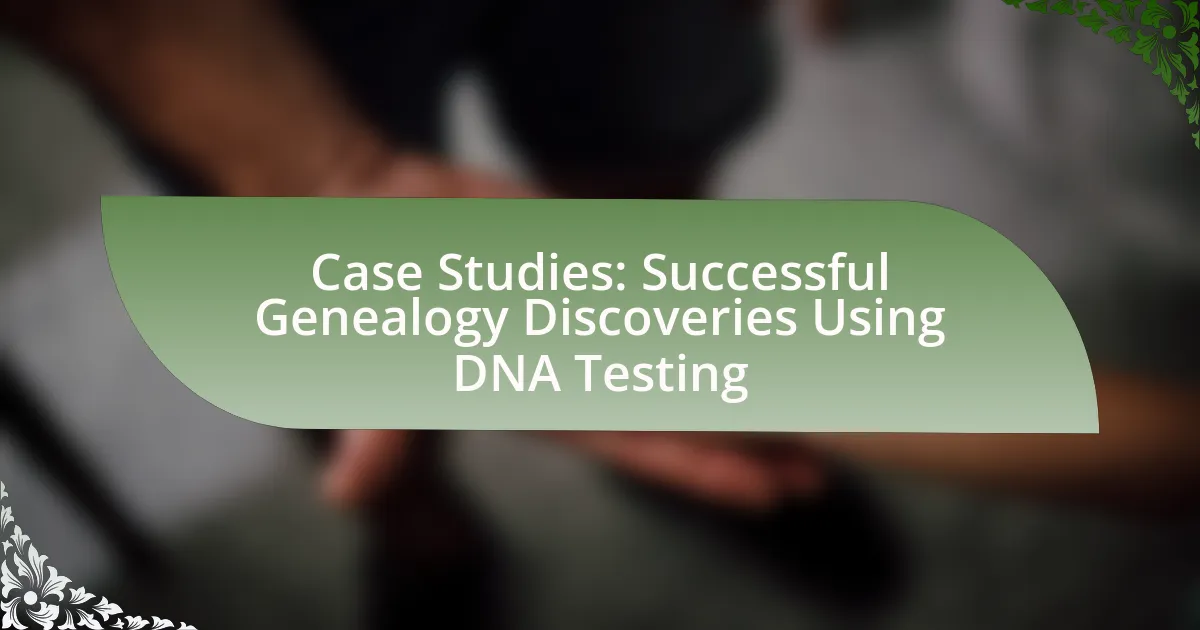Genetic genealogy is a powerful tool that significantly impacts historical research by providing biological evidence to confirm or challenge historical narratives. This article explores how DNA analysis enhances the understanding of lineage, migration patterns, and familial connections, revealing insights that traditional historical records may overlook. It discusses methodologies used in genetic genealogy, the role of genetic markers in tracing ancestry, and the ethical considerations surrounding genetic data usage. Additionally, it highlights specific case studies that illustrate the transformative effects of genetic genealogy on historical research and outlines future trends and practical tips for researchers in this evolving field.
What is the Impact of Genetic Genealogy on Historical Research?

Genetic genealogy significantly enhances historical research by providing concrete biological evidence that can confirm or refute historical narratives. This method allows researchers to trace lineage and migration patterns through DNA analysis, which can reveal connections between individuals and populations that historical records may not document. For example, studies have shown that genetic data can corroborate historical accounts of migration, such as the movement of populations during the transatlantic slave trade, where genetic evidence has traced African ancestry in the Americas. Additionally, genetic genealogy has been instrumental in identifying historical figures and resolving questions about familial relationships, as seen in the case of the remains of Richard III, where DNA testing confirmed his identity.
How does genetic genealogy contribute to historical research?
Genetic genealogy contributes to historical research by providing DNA evidence that can confirm or refute historical narratives and genealogical connections. This scientific approach allows researchers to trace lineage and migration patterns, offering insights into population dynamics and historical events. For instance, studies have shown that genetic data can reveal relationships among individuals from different geographical regions, thereby enhancing our understanding of historical population movements, such as the migration of early humans out of Africa. Additionally, genetic genealogy has been instrumental in identifying descendants of historical figures and uncovering familial ties that were previously undocumented, thus enriching the historical record.
What methodologies are used in genetic genealogy for historical analysis?
Genetic genealogy employs methodologies such as DNA testing, genealogical research, and bioinformatics for historical analysis. DNA testing involves analyzing autosomal, Y-chromosome, and mitochondrial DNA to trace lineage and ancestral origins. Genealogical research complements DNA findings by utilizing historical records, family trees, and oral histories to construct comprehensive family narratives. Bioinformatics plays a crucial role in interpreting genetic data, allowing researchers to identify genetic markers associated with specific populations or historical events. These methodologies collectively enhance the understanding of human migration patterns, population genetics, and familial connections throughout history.
How do genetic markers assist in tracing historical lineages?
Genetic markers assist in tracing historical lineages by providing unique DNA sequences that can be compared across individuals and populations. These markers, such as single nucleotide polymorphisms (SNPs) and mitochondrial DNA (mtDNA), reveal ancestral connections and migration patterns. For instance, studies have shown that mtDNA can trace maternal lineage back thousands of years, while Y-chromosome markers can identify paternal ancestry. Research published in “Nature” by Zerjal et al. (2003) demonstrated how Y-chromosome analysis helped trace the lineage of specific male lineages in Central Asia, illustrating the utility of genetic markers in reconstructing historical narratives.
Why is genetic genealogy significant in understanding ancestry?
Genetic genealogy is significant in understanding ancestry because it provides concrete biological evidence that complements traditional genealogical research. By analyzing DNA markers, individuals can trace their lineage and establish connections to distant relatives, revealing ancestral origins that may not be documented in historical records. Studies have shown that genetic testing can uncover previously unknown family ties and ethnic backgrounds, enhancing the understanding of personal and collective histories. For instance, a 2019 study published in the journal “Nature” demonstrated that genetic data could accurately reconstruct family trees, confirming relationships that were only speculated through conventional methods. This integration of genetic information with genealogical research allows for a more comprehensive understanding of ancestry, bridging gaps in historical documentation.
What role does genetic genealogy play in uncovering family histories?
Genetic genealogy plays a crucial role in uncovering family histories by utilizing DNA testing to trace lineage and establish familial connections. This method allows individuals to identify relatives and ancestors that traditional genealogical research may not reveal, as DNA can provide evidence of relationships that are not documented in historical records. For instance, studies have shown that genetic testing can uncover previously unknown branches of family trees, helping individuals connect with distant relatives and understand their heritage more comprehensively. Additionally, genetic genealogy has been instrumental in solving historical mysteries, such as identifying descendants of historical figures or uncovering the origins of specific populations, thereby enriching the narrative of family histories with scientific data.
How does it challenge or confirm traditional historical narratives?
Genetic genealogy challenges traditional historical narratives by providing empirical evidence that can contradict established historical accounts. For instance, DNA testing has revealed that certain populations believed to be distinct based on historical records share genetic markers, indicating a more complex intermingling of groups than previously understood. A notable example is the genetic analysis of the descendants of enslaved Africans in the Americas, which has uncovered connections to various African regions, challenging the simplistic narratives of a singular origin. This empirical approach allows for a reevaluation of migration patterns and social structures, thereby enriching historical understanding with data-driven insights.
What are the ethical considerations in using genetic genealogy for historical research?
The ethical considerations in using genetic genealogy for historical research include issues of privacy, consent, and the potential for misuse of genetic information. Researchers must ensure that individuals whose genetic data is used have provided informed consent, as many may not fully understand the implications of sharing their genetic information. Additionally, there is a risk of stigmatization or discrimination based on genetic findings, which can affect individuals and their families. The potential for revealing sensitive information about ancestry or health can also lead to emotional distress. Ethical guidelines and frameworks, such as those proposed by the American Society of Human Genetics, emphasize the importance of transparency and respect for individuals’ rights in genetic research.
How do privacy concerns affect genetic data usage in research?
Privacy concerns significantly limit the usage of genetic data in research by imposing restrictions on data sharing and participant consent. Researchers must navigate ethical guidelines and legal frameworks, such as the Health Insurance Portability and Accountability Act (HIPAA) in the United States, which mandates strict confidentiality measures for personal health information, including genetic data. These regulations often lead to challenges in obtaining comprehensive datasets necessary for robust research, as individuals may be hesitant to share their genetic information due to fears of misuse or discrimination. Consequently, privacy concerns can hinder the advancement of genetic research, as seen in studies where participant recruitment is affected by apprehensions regarding data security and potential breaches.
What guidelines exist to ensure ethical practices in genetic genealogy?
Guidelines to ensure ethical practices in genetic genealogy include obtaining informed consent from participants, ensuring data privacy and security, and promoting transparency in research methodologies. Informed consent requires that individuals understand how their genetic data will be used, shared, and stored, which is crucial for ethical compliance. Data privacy and security measures must be implemented to protect sensitive genetic information from unauthorized access or misuse. Additionally, transparency in research methodologies fosters trust and accountability, allowing participants to be aware of the research goals and potential implications of their genetic information. These guidelines are supported by organizations such as the American Society of Human Genetics, which emphasizes ethical standards in genetic research.
How has genetic genealogy changed the landscape of historical research?
Genetic genealogy has significantly transformed historical research by providing new methods for verifying lineage and uncovering ancestral connections. This approach allows researchers to analyze DNA sequences alongside traditional historical records, enabling them to confirm or refute historical narratives. For instance, the use of genetic testing has helped identify the descendants of historical figures, such as the confirmation of the remains of King Richard III through mitochondrial DNA analysis, which matched living relatives. This integration of genetic data with historical documentation enhances the accuracy of genealogical research and offers insights into population migrations, genetic diversity, and familial relationships that were previously difficult to ascertain.
What specific case studies illustrate the impact of genetic genealogy?
Specific case studies illustrating the impact of genetic genealogy include the identification of the Golden State Killer and the resolution of the 1990 cold case murder of Christine Morton. In the Golden State Killer case, investigators used genetic genealogy to match DNA from crime scenes to distant relatives found in public DNA databases, leading to the arrest of Joseph James DeAngelo in 2018. This method showcased the power of genetic genealogy in solving crimes that had remained unsolved for decades. Similarly, in the Christine Morton case, genetic genealogy helped exonerate her husband, who had been wrongfully convicted, by identifying the true perpetrator through DNA analysis linked to genealogical records. These cases demonstrate how genetic genealogy can significantly advance criminal investigations and historical research by providing new avenues for solving long-standing mysteries.
How did genetic genealogy resolve historical mysteries in specific cases?
Genetic genealogy has resolved historical mysteries by providing concrete evidence of familial relationships and ancestral origins, which traditional genealogical methods could not ascertain. For instance, the identification of the remains of King Richard III in 2012 was achieved through DNA analysis that matched genetic markers from living descendants, confirming his lineage and resolving centuries of speculation about his burial site. Similarly, genetic testing helped solve the mystery of the “Golden State Killer,” where familial DNA linked distant relatives to the suspect, leading to his arrest in 2018. These cases illustrate how genetic genealogy serves as a powerful tool in uncovering historical truths and resolving long-standing questions about identity and lineage.
What lessons can be learned from these case studies?
Lessons learned from these case studies include the importance of integrating genetic data with traditional historical research methods. This integration enhances the accuracy of genealogical connections and provides new insights into historical narratives. For instance, case studies have demonstrated that genetic genealogy can confirm or refute historical records, as seen in the identification of descendants of historical figures through DNA analysis. Additionally, these studies highlight the potential for uncovering previously unknown familial relationships, which can reshape our understanding of historical events and migrations. The application of genetic genealogy has proven to be a valuable tool in bridging gaps in historical documentation, thereby enriching the field of historical research.
What future trends can we expect in genetic genealogy and historical research?
Future trends in genetic genealogy and historical research include increased integration of advanced DNA analysis techniques, such as whole genome sequencing, which will enhance the accuracy of ancestral connections and historical narratives. As technology evolves, the accessibility of genetic testing will expand, allowing more individuals to participate in genealogical research, thereby enriching databases and facilitating larger-scale studies. Additionally, the collaboration between geneticists and historians is expected to grow, leading to interdisciplinary projects that combine genetic data with historical records, ultimately providing deeper insights into population migrations and historical events. The rise of artificial intelligence in data analysis will also streamline the interpretation of genetic data, making it easier to identify patterns and correlations relevant to historical research.
How might advancements in technology influence genetic genealogy?
Advancements in technology significantly enhance genetic genealogy by improving the accuracy and accessibility of DNA testing. Innovations such as next-generation sequencing and bioinformatics tools allow for more detailed analysis of genetic data, enabling individuals to trace their ancestry with greater precision. For instance, the cost of whole-genome sequencing has decreased dramatically, making it accessible to a broader audience, which in turn increases the amount of genetic data available for genealogical research. Additionally, advancements in machine learning algorithms facilitate the identification of genetic markers associated with specific populations, further refining ancestry estimates. These technological improvements not only streamline the process of genetic analysis but also expand the potential for discovering previously unknown familial connections, thereby enriching historical research.
What potential developments could enhance historical research methodologies?
The integration of advanced genetic analysis techniques could significantly enhance historical research methodologies. By utilizing DNA sequencing and analysis, researchers can uncover ancestral connections and migration patterns that traditional historical methods may overlook. For instance, studies like “Genetic Evidence for the Origins of the Etruscans” published in Nature Communications demonstrate how genetic data can provide insights into population movements and historical demographics, thereby enriching the understanding of historical narratives. This combination of genetic genealogy with traditional archival research allows for a more comprehensive approach to understanding history, bridging gaps that conventional methods alone cannot fill.
What practical tips can researchers follow when utilizing genetic genealogy?
Researchers utilizing genetic genealogy should start by selecting a reputable DNA testing service that offers comprehensive ancestry analysis. This ensures access to a wide database of genetic matches, which can enhance the accuracy of genealogical connections. Additionally, researchers should document their findings meticulously, including the specific tests taken and the results obtained, as this creates a clear record for future reference and validation.
Moreover, engaging with online genetic genealogy communities can provide valuable insights and support, as experienced members often share tips and strategies for interpreting results. Researchers should also consider triangulating DNA matches with traditional genealogical records, such as census data and birth certificates, to strengthen their conclusions. This approach is supported by studies indicating that combining genetic data with historical documents significantly improves the reliability of genealogical research.




